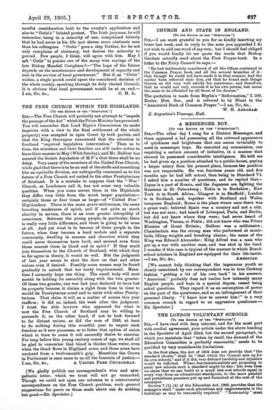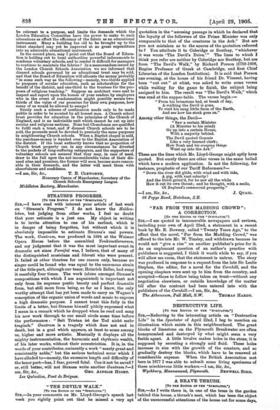[To THZ EDITOR OP THE "SPECTATOR"] SIR,—I have read with
deep interest, and for the most part with cordial agreement, your article under the above heading in the Spectator of April 22nd, but the second paragraph, in which you maintain that "taken by itself, the demand of the Education Committee is perfectly reasonable," needs to be qualified by very considerable limitations.
In the first place, the Act of 1902 does not provide that "the standard chosen" shall be "that which the Council sets up for its own schools," and if it did, very distinct hardship and injustice would be inflicted. Where denominationaliits are proposing to erect new schools such a standard might be fair ; but even then we claim that we can build at a much less cost schools equal in every way, from an educational standpoint, to the more palatial and pretentious premises put up and furnished at the cost of the ratepayer. Section 7 (1) (a) of the Education Act, 1902, provides that the managers shall "make such alterations and improvements in the buildings as may be reasonably required." " Reasonably " must be relevant to a purpose, and limits the demands which the London Education Committee have the power to make to such alterations as affect the efficiency of the fabric as an educational instrument. Many a building too old to be brought up to the latest standard may yet be improved at no great expenditure into an admirable educational instrument.
In the second place, may I point out that the Board of Educa- tion is holding out to local authorities powerful inducements to condemn voluntary schools, and to render it difficult for managers to continue to maintain the fabrics ? In a memorandum issued by the London Church Schools Association we are informed that disused schools governed by an educational trust may be sold, and that the Board of Education will allocate the money probably "in some such way as the following—namely, two-thirds applied to purposes of secular education, such as scholarships for the benefit of the district, and one-third to the trustees for the pur- poses of religious teaching." Suppose 8,n architect were sent to inspect and report upon the homes of your readers by employers who in the event of condemnation might possibly secure two- thirds of the value of our premises for their own purposes, how many of us would be allowed to escape?
Surely such a scheme of confiscation needs only to be made public in order to be scouted by all honest men. A Church school trust provides for education in the principles of the Church of England, and is an indivisible unit which cannot be cut up into secular and religious sections. None but Churchmen are qualified to fulfil such a trust, and if disused Church schools are to be sold, the proceeds must be devoted to precisely the same purposes in neighbouring Church schools. When a Baptist chapel is sold, the purchase-money is handed over to the Baptist Association of the district. If the local authority knows that no proportion of Church trust property can in any circumstances be diverted to the pockets of long-suffering ratepayers, and the supporters of voluntary schools are assured that they may, in case of need, draw to the full upon the not inconsiderable value of their dis- used sites and premises, the former will soon become more reason- able in their demands, and the latter will meet them with cheerfulness and confidence.
Honorary Canon of Manchester, Secretary of the • Church Schools Emergency League. Middleton Rectory, Manchester.



















































 Previous page
Previous page